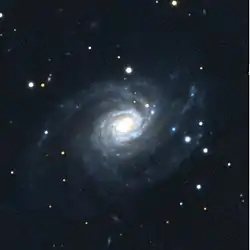NGC 753
NGC 753 is a spiral galaxy[3] located 220 million light-years away[2] in the constellation Andromeda. The galaxy was discovered by astronomer by Heinrich d'Arrest on September 16, 1865[4] and is a member of Abell 262.[5][6][7][8][9][10]
| NGC 753 | |
|---|---|
 PanSTARRS image of NGC 753. | |
| Observation data (J2000 epoch) | |
| Constellation | Andromeda |
| Right ascension | 01h 57m 42.2s[1] |
| Declination | 35° 54′ 58″[1] |
| Redshift | 0.016355[1] |
| Helio radial velocity | 4903 km/s[1] |
| Distance | 220 Mly (67 Mpc)[2] |
| Group or cluster | Abell 262 |
| Apparent magnitude (V) | 12.97[1] |
| Characteristics | |
| Type | SAB(rs)bc[1] |
| Size | ~150,000 ly (46 kpc) (estimated)[1] |
| Apparent size (V) | 2.5 x 1.9[1] |
| Other designations | |
| MCG 6-5-66, PGC 7387, UGC 1437[1] | |
NGC 753 has roughly 2-3 times more mass than the Milky Way[5] and is classified as a radio galaxy.[11][12][13]
Physical characteristics
NGC 753 contains two main arms that extend to 180° on either side of the galaxy.[14][15] From the two main arms, there are three larger and weaker arms that sub-divide into several branches.[14] This open structure of the arms may be due to the influence of NGC 759 which is a close companion of NGC 753[14][15] that lies 1.4 Mly (0.44 Mpc) away.[15]
Supermassive black hole
NGC 753 has a supermassive black hole with an estimated mass of (2.2 ± 0.4) × 107 M☉.[16]
Supernovae
NGC 753 has hosted two supernovae,[17] SN 1954E which was discovered by Fritz Zwicky[18][19] on September 26, 1954[18][19][17][20] and AT 2018ddf which was discovered on July 5, 2018.[17][21][22] Both supernovae were of unknown types.[17][19][21][20][22]
See also
References
- "NASA/IPAC Extragalactic Database". Results for NGC 753. Retrieved 2019-01-03.
- Pilyugin, L. S.; Grebel, E. K.; Kniazev, A. Y. (2014). "The Abundance Properties of Nearby Late-type Galaxies. I. The Data". The Astronomical Journal. 147 (6): 131. arXiv:1403.5461. Bibcode:2014AJ....147..131P. doi:10.1088/0004-6256/147/6/131. ISSN 1538-3881. S2CID 119239041.
- "Your NED Search Results". ned.ipac.caltech.edu. Retrieved 2019-01-03.
- "New General Catalog Objects: NGC 750 - 799". cseligman.com. Retrieved 2019-01-03.
- Henry, R. B. C.; Balkowski, C.; Cayatte, V.; Edmunds, M. G.; Pagel, B. E. J. (1996-12-01). "The effects of cluster environment on the chemical evolution of galaxies. III. NGC 753". Monthly Notices of the Royal Astronomical Society. 283 (2): 635–647. Bibcode:1996MNRAS.283..635H. doi:10.1093/mnras/283.2.635. ISSN 0035-8711.
- Giuricin, G.; Marinoni, C.; Ceriani, L.; Pisani, A. (November 2000). "Nearby Optical Galaxies: Selection of the Sample and Identification of Groups". The Astrophysical Journal. 543 (1): 178–194. arXiv:astro-ph/0001140. Bibcode:2000ApJ...543..178G. doi:10.1086/317070. ISSN 0004-637X. S2CID 9618325.
- Garcia, A. M. (1993-07-01). "General study of group membership. II - Determination of nearby groups". Astronomy and Astrophysics Supplement Series. 100: 47–90. Bibcode:1993A&AS..100...47G. ISSN 0365-0138.
- Fouque, P.; Gourgoulhon, E.; Chamaraux, P.; Paturel, G. (1992-05-01). "Groups of galaxies within 80 Mpc. II - The catalogue of groups and group members". Astronomy and Astrophysics Supplement Series. 93: 211–233. Bibcode:1992A&AS...93..211F. ISSN 0365-0138.
- "NGC 753". sim-id. Retrieved 2019-01-03.
- "Detailed Object Classifications". ned.ipac.caltech.edu. Retrieved 2019-01-03.
- Righetti, G.; Giovannini, G.; Feretti, L. (1988-04-01). "WSRT observations at 327 MHz of the cluster A262". Astronomy and Astrophysics Supplement Series. 73: 173–179. Bibcode:1988A&AS...73..173R. ISSN 0365-0138.
- Zhao, Jun-Hui; Burns, Jack O.; Owen, Frazer N. (1989-07-01). "A 20 CM VLA survey of Abell clusters of galaxies. I - Distance class of not greater than 3 clusters". The Astronomical Journal. 98: 64–107. Bibcode:1989AJ.....98...64Z. doi:10.1086/115128. ISSN 0004-6256.
- Miller, Neal A.; Owen, Frazer N. (2001-06-01). "The Radio Galaxy Populations of Nearby Northern Abell Clusters". The Astrophysical Journal Supplement Series. 134 (2): 355–383. arXiv:astro-ph/0101114. Bibcode:2001ApJS..134..355M. doi:10.1086/320857. ISSN 0067-0049. S2CID 119052072.
- del Rio, M. S.; Cepa, J. (1998-12-01). "The nature of arms in spiral galaxies. III. Azimuthal profiles". Astronomy and Astrophysics. 340: 1–20. Bibcode:1998A&A...340....1D. ISSN 0004-6361.
- del Río, M. S.; Cepa, J. (1999-01-01). "The nature of arms in spiral galaxies. IV. Symmetries and asymmetries". Astronomy and Astrophysics Supplement Series. 134 (2): 333–358. Bibcode:1999A&AS..134..333D. doi:10.1051/aas:1999440. ISSN 0365-0138.
- Seigar, Marc S.; Kennefick, Daniel; Kennefick, Julia; Lacy, Claud H. S. (2008-05-10). "Discovery of a relationship between spiral arm morphology and supermassive black hole mass in disk galaxies". The Astrophysical Journal. 678 (2): L93–L96. arXiv:0804.0773. Bibcode:2008ApJ...678L..93S. doi:10.1086/588727. ISSN 0004-637X. S2CID 118430417.
- "List of supernovae sorted by host name". Bright Supernova - Archives. Retrieved 2019-01-03.
- Kowal, C. T.; Sargent, W. L. W.; Zwicky, F. (1970-06-01). "The 1969 Palomar Supernova Search". Publications of the Astronomical Society of the Pacific. 82 (487): 736. Bibcode:1970PASP...82..736K. doi:10.1086/128951. ISSN 0004-6280.
- "Other Supernovae images". rochesterastronomy.org. Retrieved 2019-01-04.
- "1954E | Transient Name Server". wis-tns.weizmann.ac.il. Retrieved 2019-01-04.
- "Bright Supernovae - 2018". rochesterastronomy.org. Retrieved 2019-01-04.
- "AT 2018ddf | Transient Name Server". wis-tns.weizmann.ac.il. Retrieved 2019-01-04.
External links
| Wikimedia Commons has media related to NGC 753. |
- NGC 753 on WikiSky: DSS2, SDSS, GALEX, IRAS, Hydrogen α, X-Ray, Astrophoto, Sky Map, Articles and images
